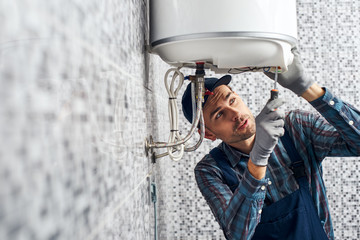If you are looking to install a new water heater, there are some things you need to know. First, several options are available, each with its unique features. It would be best if you also considered the costs and labor involved. Labor costs will vary depending on the location and the experience level of the individual who installs the water heater. A plumber will average around $50 to $100 per hour for the installation. The task of a professional Plumbers include materials like pipe fittings and venting pipes.
 In the world of water heaters, there are two main types of heating devices. They are power vents and direct vents. There are also many variations among these two types, which can be confusing to homeowners. Here are a few things you should know about them. Power vents are more expensive than their direct vent counterparts. However, they do offer some advantages, including lower installation costs. For instance, direct power vents may be installed with PVC piping, which is less costly than metal pipe. This type of installation can save a homeowner money in the long run.
In the world of water heaters, there are two main types of heating devices. They are power vents and direct vents. There are also many variations among these two types, which can be confusing to homeowners. Here are a few things you should know about them. Power vents are more expensive than their direct vent counterparts. However, they do offer some advantages, including lower installation costs. For instance, direct power vents may be installed with PVC piping, which is less costly than metal pipe. This type of installation can save a homeowner money in the long run.
Direct vents are more efficient and silent. They capture the combustion heat from the fuel used to heat the water. These systems also reduce backdrafting, which releases excess heated air within the home. Compared to power vents, direct vents also offer greater flexibility. They can be installed in smaller spaces, such as a closet or attic. A water heater’s cost varies by various factors, including its size, type, and fuel source. A new unit may also require plumbing work and drywall installation.
Labor is one of the most common costs associated with installing a water heater. Some plumbers charge a flat rate for water heater installations, but others will charge by the hour. For a typical home, a professional installer can complete the job in a single day. The size of the tank will have a major impact on the cost of the heater. A 50-gallon unit can cost up to $1500, while a 60-gallon model can set you back $2000 or more. In addition to the cost of a new water heater, you’ll need to pay for the labor to remove the old unit. Removing a tank can be tricky and could involve a lot of carpentry work. Depending on the size of the tank, the cost of removal might be as small as $200 to as large as $500 or more.
The cost of installing a new water heater depends on several factors. Some of the major costs include the labor and materials. These costs can vary greatly based on where you live and the type of water heater you choose. Typical prices for labor range from $150 to $800. Labor costs can be higher or lower depending on the contractor’s experience level and the complexity of the job. If you’re replacing a tank-style water heater, you’ll need to remove the old unit. Removing a tank style water heater can add up to three hours to the installation process.
A professional plumber typically charges between $270 and $520 to install a new tank water heater. Additional costs may include the disposal of the old unit and a permit fee. If your current water heater is difficult to access, the removal and installation can add up to $1000 or more. You’ll also need to upgrade the tank’s wiring and venting. Signs that your water heater needs replacing. If you have a water heater that doesn’t provide hot water as often as you’d like, it may be time to replace it. A new unit can save you up to $700 in energy costs over the life of the unit. If your water heater isn’t heating as much as it used to, it might be because it is aging. It’s also possible that your unit isn’t working properly or has a problem with its thermostat. These can be addressed by checking the water heater parts and replacing them when necessary.
Another sign that you need a new water heater is rusty or metallic-tasting water. Rusty water is usually the result of corrosion inside the water heater. The rust can discolor the water and other appliances and clog up the system. In addition, you should consider whether your water heater is properly venting. If it’s not, your tank might be leaking. You should have your water heater checked regularly by a professional.

